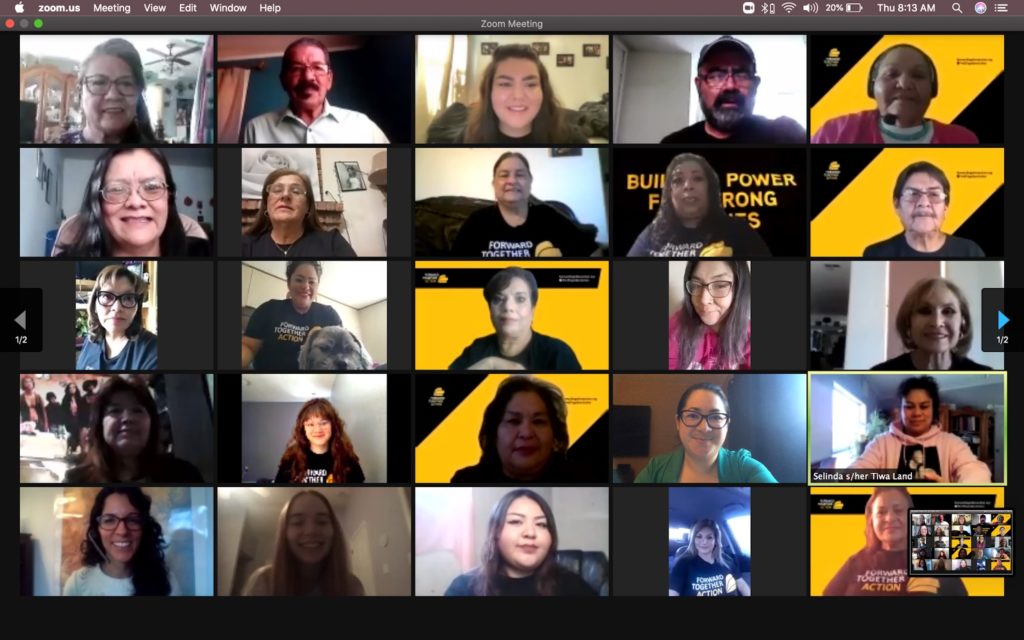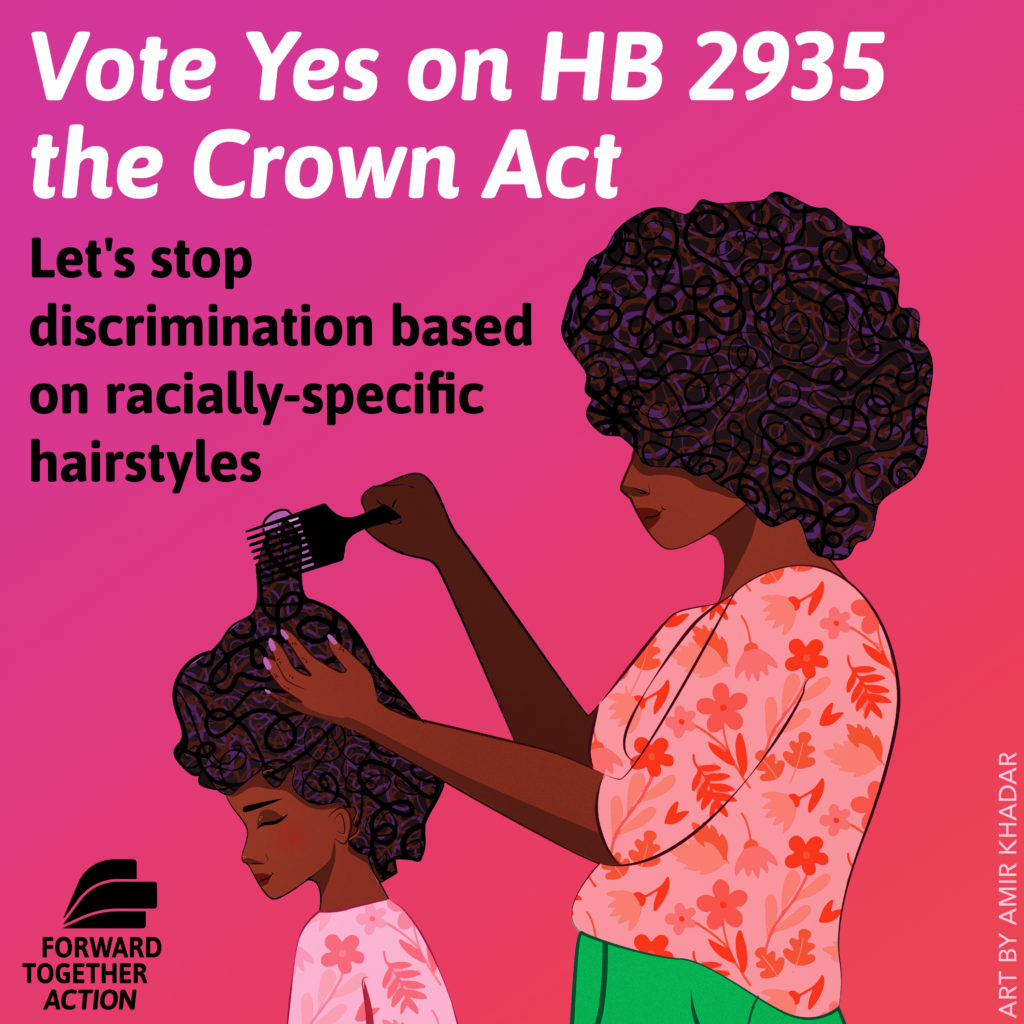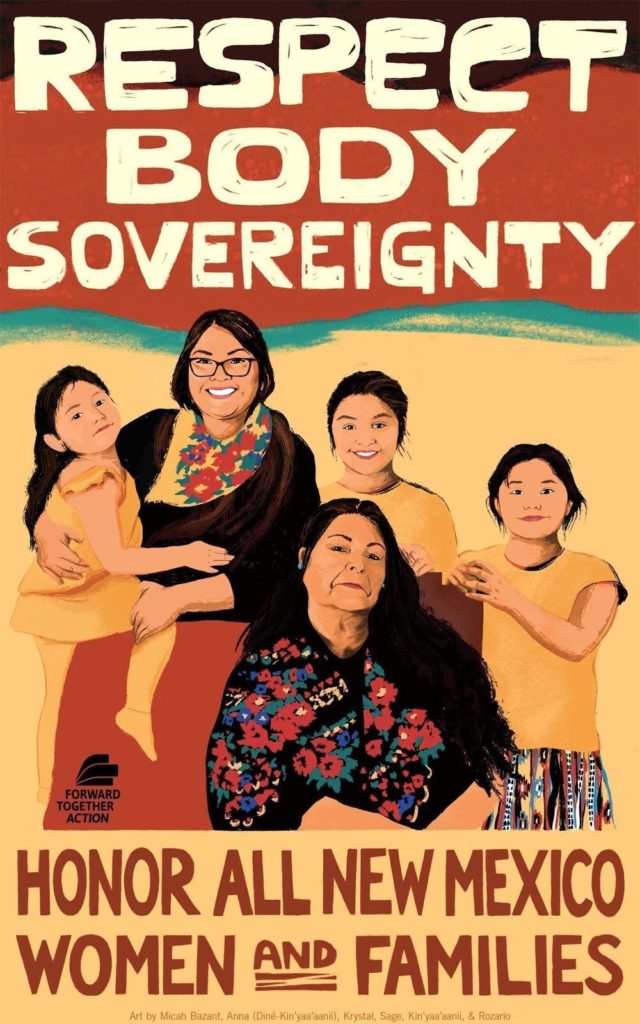
Our Community Leaders are Powerful! Forward Together Action leaders win critical reproductive and racial justice polices
October 12, 2021In this year’s virtual legislative sessions, our leaders from across New Mexico and Oregon showed how when we nurture BIPOC leadership we build real power and change for our communities. Thanks to the courage and dedication of our leaders, we were able to pass the majority of our priority bills, including the repeal of an abortion ban in New Mexico, and the passage of the CROWN Act, which makes it illegal to discriminate against Black Oregonians on the basis of hair.
In New Mexico, our group of 30 legislative fellows spent two months fully immersed in the virtual legislative session. Their courageous testimonies, pressure on legislators and thoughtful outreach to their communities resulted in the repeal of New Mexico’s outdated, harmful abortion ban. They also helped pass three crucial healthcare bills, which will expand healthcare affordability for New Mexicans, prohibit discrimination of immigrants in accessing and receiving local health benefits and protect families from medical debt collection.
In Oregon, community leaders worked tirelessly to pass two important pieces of legislation that will further racial justice and equity in the state. With the passage of the CROWN Act, it is no longer legal to discriminate against Black people in the workplace or schools because of their natural or protective hairstyle. Leaders also organized in support of the Language Access Act, which ensures that the state will translate and publish voter materials in the 5 most commonly spoken languages in the state in addition to English.

“As a Black mama, I’m raising my daughter to love her hair, to feel proud of it, and to see it as beautiful. I want her to feel good about her hair… The passage of the CROWN Act means Black Oregonians will no longer have to give up parts of our culture or our identity just to be able to go to school or work.”
— Denequa Jameelah Rasheed, FTA Community Leader
As the Oregon legislative session unfolded, a core group of Black and Indigenous birth workers, doulas and birthing people spent six months deepening their analysis of birth justice policies and organizing through the Birth Justice Committee. They developed policy criteria together and met and built with legislators, all while centering their stories as birth workers and birthing people.

Challenges of an All Virtual Session
The legislative process can be an intimidating and discouraging experience. Making the session accessible meant not only deepening our leaders’ knowledge of the legislative process, but also making sure everyone had their own electronic devices and Internet access. For example, our fellows in New Mexico, most of whom live in under-resourced rural areas, received ongoing tech support and training on how to use a laptop, set up and use email, use Zoom and more.
In Oregon, field organizers worked with community leaders to make sure they had all they needed in order to testify in virtual hearings, from practicing their testimonies over the phone, to troubleshooting tech issues live, to keeping each other updated on the latest developments.
Even when faced with technological issues, our leaders pushed through, because they know how transformative these policies will be.
The fellows in New Mexico attended daily prep calls and hearings, called legislators and participated in weekly phone banks and text banks about the Repeal Bill. Leaders like Anna Rondon and her daughter Krystal Curley shared their personal stories and beliefs on abortion and healthcare access in committee hearings and at their dinner tables, because they know their stories are powerful.

“I have always felt drawn away from politics because of the pain [it has caused me], but it is a beautiful thing to be able to share our stories and who we are, and to have the support and understanding from the community here.”
— Krystal Curley, FTA Community Leader
In Oregon, Black leaders testified, lobbied legislators, led political education nights for the community, and told their stories of hair discrimination in the media to ensure that Black hair will no longer be policed by institutions.
“I’ve worn my locs for more than 15 years, and I’ve experienced workplace discrimination because of my hair. When Black hair is policed in a workplace or a school, it means choosing between your financial freedom or your education and your cultural identity. No one should be forced to make that choice.”
— Erin Waters, FTA Community Leader
Lawmakers don’t always listen to the communities they purportedly represent. We made sure they listened. In New Mexico, legislative fellows attended committee hearings so legislators knew our communities were listening. We made sure a Spanish interpreter was present at committee hearings so our Spanish-speaking fellows could fully participate in the process. In both New Mexico and in Oregon, community leaders mobilized their community networks around the issues being debated on the floor.
“Before the fellowship, I was nervous to speak to decision makers and in committees, but I was inspired to see the work done with love and care. I’m no longer worried about saying everything perfectly; I speak because I have love and care about the issues. I want to continue organizing.”
— Sophie Kim, FTA Community Leader
Your support as a donor and activist amplifies the incredible work of our community leaders that accomplished these wins. It sustains all the multifaceted efforts that get us to system-changing legislation: deep community organizing, nurturing leadership, tech access, skill building, and grassroots power that carries our movements forward.